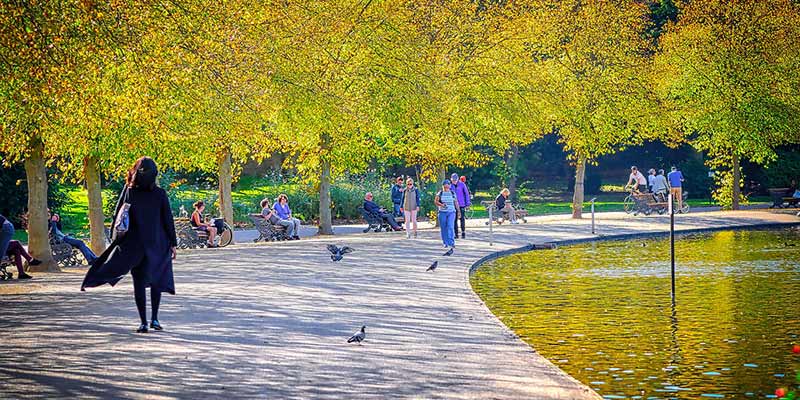Inequalities in accessing greenspaces during and after COVID-19 lockdowns
The Leverhulme Centre for Anthropocene Biodiversity (LCAB) is funding a new research project aiming to explore the drivers behind inequalities in accessing greenspaces in Leeds.

A growing body of research shows that time spent in natural environments is associated with a range of positive health, wellbeing and social impacts. Between 2009 and 2019, Natural England and DEFRA ran the Monitor Engagement with the Natural Environment survey (MENE), capturing time spent in the natural environment and other related activities.
Analysis of this data shows inequalities in access to greenspaces and the natural environment, with people from Black and other ethnic minority (BAME) communities and those from low income households less likely to visit or spend time in these areas.
Given the positive impacts that this access and engagement provides, it is important we understand the underlying drivers of this inequality. COVID-19 and associated movement restrictions will also be affecting access to the natural environment and potentially exacerbating these inequalities.

This new project, a collaboration between Dr Caroline Ward, LCAB Postdoctoral Research, and Natural England social science experts, will use photo diaries and interviews to explore barriers and enablers to accessing greenspaces, during and after COVID-19 lockdowns.
Caroline said of the project: “Given that some movement restrictions may be in place for the medium to long-term, especially for vulnerable groups, we hope this research could inform policy or infrastructure investment and decision making to enable increased access for disadvantaged groups, thereby improving physical and mental wellbeing and reducing inequalities therein. We’ll be working closely with Natural England to share our findings with local and National policymakers by the end of 2020.”
For further information about this project, please email caroline.ward@york.ac.uk
Related links
- Collins, R.M., Spake, R., Brown, K.A., Ogutu, B.O., Smith, D. and Eigenbrod, F., 2020. A systematic map of research exploring the effect of greenspace on mental health. Landscape and Urban Planning, 201, p.103823.
- Marselle, M.R., Martens, D., Dallimer, M. and Irvine, K.N., 2019. Review of the Mental Health and Well-being Benefits of Biodiversity. In Biodiversity and Health in the Face of Climate Change (pp. 175-211). Springer, Cham.
- Monitor of Engagement with the Natural Environment, Technical Report to the 2009 - 2019 surveys
- Images by Free-Photos from Pixabay
Related links
- Collins, R.M., Spake, R., Brown, K.A., Ogutu, B.O., Smith, D. and Eigenbrod, F., 2020. A systematic map of research exploring the effect of greenspace on mental health. Landscape and Urban Planning, 201, p.103823.
- Marselle, M.R., Martens, D., Dallimer, M. and Irvine, K.N., 2019. Review of the Mental Health and Well-being Benefits of Biodiversity. In Biodiversity and Health in the Face of Climate Change (pp. 175-211). Springer, Cham.
- Monitor of Engagement with the Natural Environment, Technical Report to the 2009 - 2019 surveys
- Images by Free-Photos from Pixabay